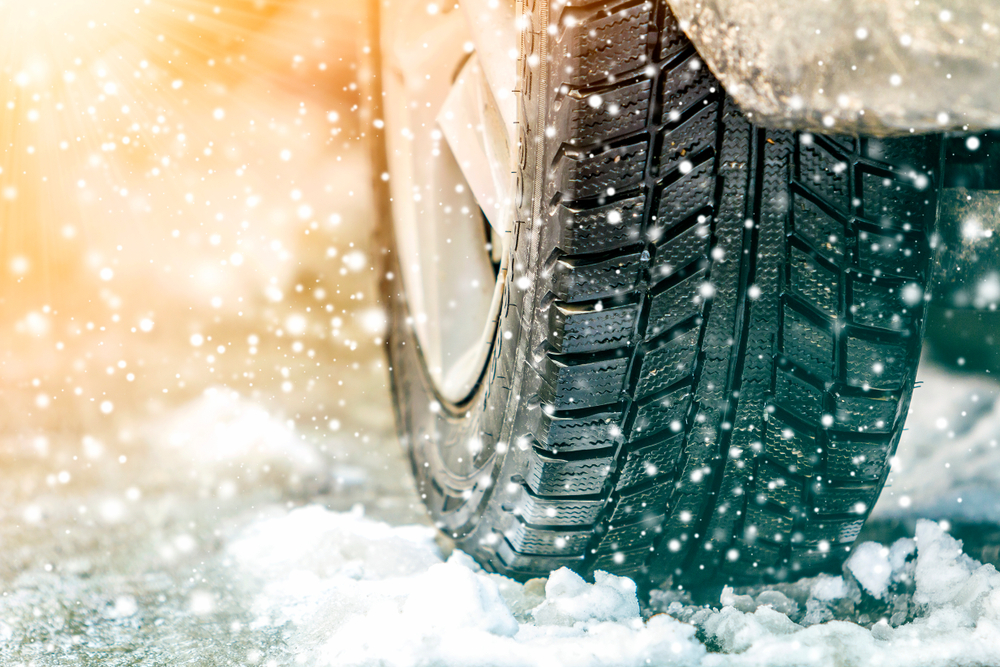Is your car ready for winter?

We put together a short guide to preparing your car for cold weather. We recommended checking your car’s tyres – but one thing we didn’t talk about was winter tyres.
What are Winter Tyres?
They’re tyres that are designed for winter! They’ll offer extra grip, better handling and a reduced stopping distance when the roads are icy and treacherous.
The biggest difference between a winter tyre and a regular tyre is the
- Tread
depth
On a standard tyre, the tread depth usually sits somewhere between 7mm and 8mm. On a winter tyre, it’s usually between 8mm and 9mm. - Wider and
deeper grooves
The idea is to form a large channel for snow and water to pass through, which results in improved handling and a better grip. - The
rubber they’re made out of
Winter tyres are made from a compound featuring a larger percentage of natural rubber and silica. With this mix, the tyre doesn’t harden as much as a synthetic regular tyre would in low temperatures, which can further improve your grip.
Do I Need Winter Tyres?
In some European countries winter tyres are a legal requirement. If you live in Germany, Sweden or Austria, it’s illegal to drive without adequate tyres during the winter months.
But if you live in the UK it’s entirely down to you. There are no UK laws governing the type of tyres you use in the winter.
So is it worth getting winter tyres in the UK?
We’ve certainly had our share of dreadful winters in recent years. Accidents are more likely in cold weather, and perhaps there’d be fewer accidents overall during UK winters if winter tyres were mandatory?
The fact is that driving in winter can be hard, and anything that’s going to make things slightly easier is absolutely worth investing in.
How Much Are Winter Tyres?
Depending on the car you drive, you might expect to pay around £60 for each winter tyre. That’s nearly £300 for a complete set. But consider the amount you might have to pay for repairs if your car’s involved in an accident. Winter tyres can make accidents less likely, so they might actually help you to save money in the long run.
This isn’t the only reason why it might be cost-effective to buy winter tyres. If you continue to use standard tyres through the winter months, they’re going to undergo a lot of wear and tear. Switching to more suitable tyres during the winter could therefore significantly prolong the life of your summer tyres.
One thing to remember though – if you do choose to get winter tyres, make sure they’re fitted in accordance with your car’s specifications and by a reputable expert who knows what they’re doing. And once the winter’s passed, make sure you switch back to standard tyres! Winter tyres stop being effective in temperatures above 7°C. In warmer weather, they can actually worsen your grip and your stopping distance!
Are Your Tyres Ready for Winter?
If you choose not to invest in a set of winter tyres, it’s still important to ensure that your tyres will keep you safe in treacherous conditions.
Check the tread on your tyres. The minimum legal tyre tread depth in the UK is 1.6mm, but for optimum safety you really need a tread depth of around 3mm. Head here to read our guide to tyre tread depth.
It’s also important to check your tyre’s pressure. Your car’s manual will specify the optimum pressure for the front and rear tyres in your car. Make sure your tyres aren’t over or under-inflated. You can check your tyre pressure at a garage or if you find those machines a bind you can buy a type pressure gauge/pump very cheaply. The incorrect tyre pressure can affect stopping distances, grip and handling – all things that you’re really going to need through the winter!
Finally, when driving in the winter, you’ll be able to drive with much more peace of mind if you have comprehensive car insurance to cover you in the event of an incident.



